The Zoological Society of London (ZSL) is a charity devoted to the worldwide conservation of animals and their habitats. It was founded in 1826. Since 1828 it has maintained the London Zoo, and since 1931 Whipsnade Park.
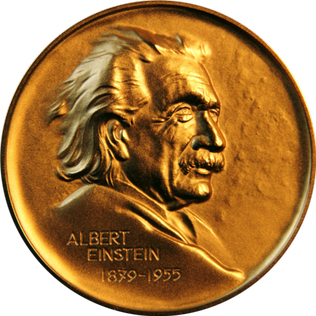
The Albert Einstein World Award for Science is an annual award given by the World Cultural Council "as a means of recognition and encouragement for scientific and technological research and development", with special consideration for researches which "have brought true benefit and well being to mankind". Named for physicist and theoretician Albert Einstein (1879–1955); the award includes a diploma, a commemorative medal, and US$10,000.

Eamon Duffy is an Irish historian. He is a professor of the history of Christianity at the University of Cambridge, and a Fellow and former president of Magdalene College.

Sumio Iijima is a Japanese physicist and inventor, often cited as the inventor of carbon nanotubes. Although carbon nanotubes had been observed prior to his "invention", Iijima's 1991 paper generated unprecedented interest in the carbon nanostructures and has since fueled intense research in the area of nanotechnology.
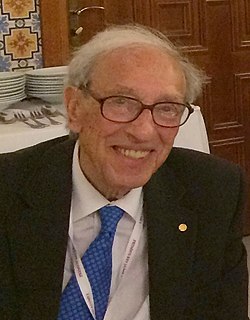
Edmond Henri Fischer was an American-Swiss biochemist. He and his collaborator Edwin G. Krebs were awarded the Nobel Prize in Physiology or Medicine in 1992 for describing how reversible phosphorylation works as a switch to activate proteins and regulate various cellular processes. From 2007 until 2014, he was the Honorary President of the World Cultural Council. At the time of his death at age 101 in 2021, he was the oldest living Nobel Prize laureate.
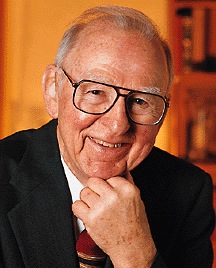
Edwin Gerhard Krebs was an American biochemist. He received the Albert Lasker Award for Basic Medical Research and the Louisa Gross Horwitz Prize of Columbia University in 1989 together with Alfred Gilman and, together with his collaborator Edmond H. Fischer, was awarded the Nobel Prize in Physiology or Medicine in 1992 for describing how reversible phosphorylation works as a switch to activate proteins and regulate various cellular processes.
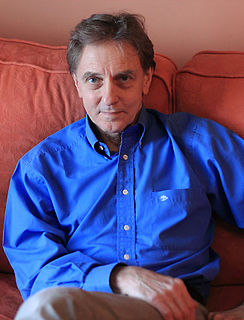
Sir Colin Blakemore,, Hon is a British neurobiologist, specialising in vision and the development of the brain, who is Yeung Kin Man Professor of Neuroscience and Senior Fellow of the Hong Kong Institute for Advanced Study, City University of Hong Kong. He is also a Distinguished Senior Fellow in the Institute of Philosophy, School of Advanced Study, University of London and Emeritus Professor of Neuroscience at the University of Oxford. He was formerly Chief Executive of the British Medical Research Council (MRC). He is best known to the public as a communicator of science but also as the target of a long-running animal rights campaign. According to The Observer, he has been both "one of the most powerful scientists in the UK" and "a hate figure for the animal rights movement".
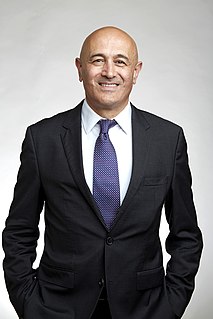
Jameel Sadik "Jim" Al-Khalili is an Iraqi-British theoretical physicist, author and broadcaster. He is professor of theoretical physics and chair in the public engagement in science at the University of Surrey. He is a regular broadcaster and presenter of science programmes on BBC radio and television, and a frequent commentator about science in other British media.
Sir Philip Cohen FRS FRSE FMedSci is a British researcher, academic and Royal Medal winner based at the Medical Research Council Protein Phosphorylation and Ubiquitylation Unit, School of Life Sciences at the University of Dundee. During the 1990s he was the world's third most cited professor and has been described by Professor Garry Taylor of the University of St Andrews as "one of the world’s top scientists". and by Professor Sir Peter Downes as "arguably the UK's leading biochemist and an iconic figure in UK science". As of 2008 he has written over 470 peer-reviewed papers and given over 250 invited lectures in 33 countries, and has been repeatedly linked to a move of biotechnology companies to Dundee and the economic regeneration that came with it, to the point where 15% of the local economy is derived from biotech companies and their employees. His work has also seen Dundee attracting some of the world's best scientists, with over 1% of the world's most cited scientists residing in Dundee and fundraising of more than £35 million over the last 10 years to help attract them.
Sir Keith Vivian Thomas is a Welsh historian of the early modern world based at Oxford University. He is best known as the author of Religion and the Decline of Magic and Man and the Natural World. From 1986 to 2000, he was president of Corpus Christi College, Oxford.
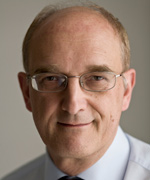
Sir Leszek Krzysztof Borysiewicz is a British professor, immunologist and scientific administrator of Polish-Welsh heritage. He served as the 345th Vice-Chancellor of the University of Cambridge, his term of office started on 1 October 2010 and ended on 1 October 2017. Borysiewicz also served as chief executive of the Medical Research Council of the UK from 2007-2010.

Sir Christopher Martin Dobson was a British chemist, who was the John Humphrey Plummer Professor of Chemical and Structural Biology in the Department of Chemistry at the University of Cambridge, and Master of St John's College, Cambridge.
Dario Alessi FRSE FRS is a biochemist, Director of the Medical Research Council Protein Phosphorylation and Ubiquitylation Unit and Professor of Signal Transduction, at the School of Life Sciences, University of Dundee.
David Barford is a British medical researcher and structural biologist at the MRC Laboratory of Molecular Biology Cambridge, UK.
Bertil Andersson is a Swedish college administrator and academic who served as the third president of Nanyang Technological University (NTU).

The Leonardo da Vinci World Award of Arts has been established by the World Cultural Council (Mexico) to acknowledge those who offer a positive message to mankind through different expressions of art. It is conferred upon "artist, sculptor, writer, poet, cinematographer, photographer, architect, musician or other performing artist, whose work constitutes a significant contribution to the artistic legacy of the world". The award has been presented biennially since 1999.

The José Vasconcelos World Award of Education is granted by the World Cultural Council as a recognition to renowned educators, to experts in the field of teaching, and to legislators of education policies who have significant influence in enriching the culture of mankind. This award has been presented biennially since 1988.
The World Cultural Council is an international organization whose goals are to promote cultural values, goodwill and philanthropy among individuals. The organization founded in 1981 and based in Mexico, has held a yearly award ceremony since 1984 by granting the Albert Einstein World Award of Science, the José Vasconcelos World Award of Education, and the Leonardo da Vinci World Award of Arts to outstanding scientists, educators, and artists, who have contributed positively to the cultural enrichment of mankind. The members of the Council include several Nobel laureates.

The World Cultural Council had its 30th award ceremony on 2 October 2013 at Nanyang Auditorium, Nanyang Technological University, Singapore. The ceremony co-organized by host NTU was the opening event of the Times Higher Education World Academic Summit. Ms. Indranee Rajah, Senior Minister of State, Ministry of Law and Ministry of Education was the guest of honor of the event. Assistant Professor Lok Tat Seng, Director of the Students of NTU acted as Master of Ceremonies, and renown Singaporean pianist, Mr. Lim Yan, performed a few musical compositions before the ceremony and during an intermission.

The World Cultural Council celebrated its 29th award ceremony on 18 April 2012 at The Main Hall, Aarhus University, Aarhus, Denmark. Aarhus University was the co-organizer of the ceremony, which was the opening event of the conference "Excellence Revisited – The Value of Excellence."













